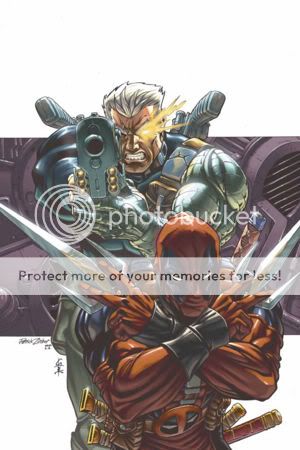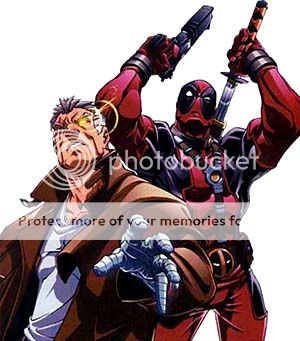Some random rambling about the best of the worst of the 1990s
I’ve been on a back-issue re-reading kick for the last few weeks, ever since I decided to tidy out the elephant’s graveyard of comics under the bed (goodbye, issues of Marvel Adventures Avengers, you were great at the time but space is limited and I may not need to revisit Batroc’s Dating Agency any time soon. Actually, scratch that, that one’s coming back out of the recycling pile). I’ve ploughed through all 109 issues of the original run on Thunderbolts (including the Avengers/Thunderbolts mini, but not including the Fightbolts… thing), and while it’s interesting to track the ups and downs of that title and the dips in quality that occur whenever there’s a creative regime change on the horizon, picking the run apart will take more than just one post.
Having finished that, I set about tackling the run of Cable & Deadpool trade paperbacks which I’d accumulated – and by the way, if you were considering buying that series in trade any time soon, I’d get on it pretty sharpish if I were you, because some of the individual volumes are going for a pretty penny on Amazon Marketplace – and it didn’t take me long to remember why I’d bought them in the first place.

Cable and Deadpool was always a weird book. I mean, just looking at the title, it was neither fish nor fowl from day one. It was launched in the wake of the cancelled Agent X and Soldier X, and reeked a little of Marvel wanting to keep the characters in circulation but not having any ideas on how to do that beyond shoving them together in a room and hoping they would somehow capture an audience by little more than the application of the equation “Cable readership + Deadpool readership = Cable and Deadpool readership”. It was not a particularly auspicious name for a book that nobody expected to last beyond its first year.
Quite aside from the fact that it was a meal made of leftovers, it was also a showcase for two characters who together symbolised the worst excesses of the 1990s. Cable was filed under ‘big guns’, ‘pouches’, ‘mysterious past’, ‘grim’ and ‘glowing eye’. Deadpool was filed under ‘anti-hero’, ‘mysterious past’, ‘pouches’, ‘kills a bit’ and ‘rip-off of another character’ (seriously, if Deathstroke the Terminator was Seth Brundle and Bugs Bunny was an unlucky insect of the order Diptera, then Deadpool was the shambling result of the teleporter accident). By all rights, they should have been consigned to the same 1990s graveyard as Century, Blackwulf and Nightwatch.
What went right with the characters, though, was that creators who weren’t interested in the low-rent origins of the pair got their hands on the characters. Joe Kelly turned Deadpool from ‘evil Spider-Man with guns’ to a rounded character who used his machine-gun quippery to mask his self-loathing, his fear of being a hero, and his fear of not being a hero. Guys like Robert Weinberg, David Tischman and Darko Macan took Cable’s basic premise of a man fighting a hopeless war across time all by himself and extrapolated a lonely, tired soldier’s story from that weak start point.
By the time Fabian Nicieza, himself the co-creator of Deadpool, got his hands on the characters with their joint title he was in a position to really do something with them, and he did. He turned Cable into a modern-day messiah, setting up an island haven for all who wanted to join him (and thus setting himself up on the watchlist of every country in the world) and Deadpool into his buddy-stroke-foil. Story after story played out with Cable as a chessmaster playing a long game, and Deadpool as his favourite pawn. Supporting characters from both of the principal players’ backgrounds (Domino, Weasel, Irene Merryweather) played key roles, as did fairly random guest stars from the four corners of the Marvel Universe (Diamondback, Commcast, the Cat).

Artist Patrick Zircher, a former collaborator of Nicieza’s on Thunderbolts, handled most of the first half of the series after a short initial run from Mark Brooks. Zircher’s angular style, miles away from the Deodatos and Finches so beloved of Marvel both at the time and since, gave the book an unusual look that helped to differentiate it from so many of the other titles on the stands at the time. After he left, the book went through a number of different fill-in and substitute pencillers before finally settling on Reilly Brown, who started with a fairly shaky couple of issues before growing into the role and finally taking on co-writing duties on the final few instalments.
Unfortunately, although Cable & Deadpool was rattling along quite happily in a wibbly wobbly world of its own, the dictates of the wider Marvel line (specifically Mike Carey’s X-Men run) brought down the hammer in the form of the death of Cable. As a book called Cable & Deadpool isn’t a whole heck of a lot of good without, y’know, Cable, the book was only able to limp on for another eight issues as a sort of ersatz Deadpool Team-Up book before being cancelled with issue 50.
While it lasted, though, it was a blast. Gag-a-minute, intrigue-heavy, and for the most part self-contained (well, sort of. It was a continuation of the Niciezaverse, which is the long, single story that Nicieza’s been telling in every Marvel book he’s written for the last ten years, so there were storylines that originated in issues of Citizen V and the V Battalion). It’s the kind of thing Marvel would do well to publish now, when the rest of the line is tied up in Secret Civil Initiative Reign War Hulk. What kind of weird, topsy-turvy world do we live in when the thought of a book starring two thrown-together examples of the nadir of the nineties is an attractive proposition?

I really enjoyed the Soldier X version of the character. I think that it mighty have been just a little bit too “worthy,” if it had gone on much longer – the premise lending itself all too readily to the “Genocide of the Month” plot (and I feel dirty just typing that).
That period, post-Onslaught, with the Kelly DeadPool, Thunderbolts, Ka-Zar! All that stuff. Although, thinking about it, Ka-Zar featured “Gregor” as a main villain. That’s “Gregor” the butler/factotum to Grim Hunter, Kraven’s first son, who died at the hands of Kaine the Spider-Clone in the same month as Doctor Octopus.
(this sketch just came on the vid as I typed the above sentence)
Seriously. Imagine Ted out of “Ralph and Ted” from The Fast Show/Brilliant! fetching up in The Savage Land, only instead of a stoopéd old groundskeeper, he was an ultra-buff macho hunter-type. Oh, Andy Kubert. Is there any camera angle you can’t exploit?
(may have exaggerated some of above for comic effect)
Lost my train of thought.
Oh, right: I wondered if there wazsn’t some sort of holding pattern going on with Cable & DeadPool. Like, they were being kept in print because it seemed like the best way to keep them around (and keep the sales going) while Marvel found them something better to do.
It’s a bit too tempting, perhaps to see the characters as redemptions of, or commentary on, their creator. The ultimate ninja-sword wiseass and the ultimate Schwarzenegger character all rolled into one…er, two…er, I got distracted by the voice of Arnie’s Cable in my head.
Which is a distrubing image to end on.
//\Oo/\\
Outside of that rambling issue during Civil War about thinly veiled political messages and the Bush administration (it was distracting, and much more preachy than what Niceiza has done in prior works), it was a good series.
Nicieza’s best work. I loved it!
The minute I saw the panel in the second trade where Deadpool joins the X-Men wearing MARVEL GIRL’S MINI-SKIRT, I knew this would endure as a comedy classic. Though to Nicieza’s credit, he was also very much able to get drama out of the situations ( for example, the issue with Cable and Deadpool talking about their formative years at a bar ). You are correct, sir, that we need more books like this from superhero companies.
Nice article Al. Along with Thunderbolts (just prior to the Ellis revamp), Nicieza was writing my two favourite Marvel books. It’s a shame they never really sold all that well. I enjoyed Carey’s X-men run (well until it became Legacy) but I’m pretty sure I’m going to drop Deadpool now, after 12 issues I’ve had enough of Way’s mediocrity.
I always like to see Nicieza getting credit. It’s not that he’s the greatest writer around, but you can trust him to make a passable comic out of any character and a good comic out of a character you like.
He’s interested in tying up loose ends in continuity in a fun way, too; in the sense of, Hey, whatever happened to that character? rather than WE MUST EXPLAIN WHY DR. LIGHT USED TO BE SCARY BUT THEN BECAME COMIC RELIEF.
Outside of that rambling issue during Civil War about thinly veiled political messages and the Bush administration
Well, in all fairness, that is sort of what Marvel claimed the crossover as a whole was supposed to be about, it’s just that Cable/Deadpool was the only title that went anywhere near politics, so it stood out amongst all the nonsense.
C&D was a great book. The two characters played off against each other really well. Cable’s role as a would-be Messiah worked so much better than the tired old soldier stuff they’re trying to pull off now.
The quality of the title declined after Cable died. Deadpool is a funny character and he was written well, but without Cable to balance Deadpool’s whackiness, the title lost its way. The fact that Nicieza didn’t even write the final issue says it all $about how Marvel messed up a wonderful title.
Well, Cable carried the over-plot of the title. Not exactly shocking, therefore, that ripping Cable out would derail it… (and Cable/DP #40 is beautiful because of, rather than despite, Nicieza’s undisguised bitterness at the turn of events in X-Office politics…).
I’m also not sure that any credit should be given to the post-Revolution writers of Cable/Soldier X for it. [Well, actually, I’m entirely certain that NO credit should be given to Macan for his issues of Cable & Soldier X, which sunk the book completely, in any way shape or form. They were black holes of credit-worthlessness.] Weinberg didn’t do anything particularly new or interesting with the character, and Tischman’s take was 180° in many ways from Nicieza’s.
If you look, in fact, there’s a certain throughline in virtually all Nicieza’s work with the character.
I only have one word to say: “Chimichanga!”
I like it when people come together and share opinions.
Great blog, keep it up!